短暂动词与延续性动词
短暂性动词和延续性动词

延续性动词和短暂性动词的区别1 延续性动词:表示可以延续一段时间的动作或状态。
延续性动词常不能和表示一个短暂具体的时间状语连用。
live,run,stay,clean,play,hold,watch,teach,read,study,teach,eat,drink,write,dance,sing,smoke2短暂性动词:表示不能延续的动作,即动作发生后立即结束。
如:begin,arrive,borrow,buy,break,close,come,fall,finish,go,leave,lend,mary,reach,receive,ope n,sell,start,stop 等。
3、代替短暂性动词的方法a)用延续性动词代替短暂性动词1、用have代替buyMy brother has had(不能用has bought) this bike for almost four years.2、用keep或have代替borrowI have kept(不能用have borrowed) the book for quite a few days.3、用be替代becomeHow long has your sister been a teacher?4、用have a cold代替catch a coldTom has had a cold since the day before yesterday.5、用wear代替put onb)用“be+形容词”代短暂性动词1、be+married代marry2、be+ill代fall (get) ill3、be+dead代die4、be+asleep代fall (get) asleep5、be+awake代wake/wake up6、be+gone代lose,die,sell,leave7、be+open代open 8、be closed代close/shut9、be+missing(gone,lost)代losec)用“be+副词”代短暂性动词1“be+on”代start,begin2“be+up”代get up3“be+back(to)”代return to,come back to,go back to4“be here (there)”代come(arrive,reach,get) here或go (arrive,reach,get) there等等d)用“be+介词短语”代短暂性动词1.“be in/at +地点”代替go to /come to2.用be in the army 代替join the army3.“be in/at +地点”代替move to(此文档部分内容来源于网络,如有侵权请告知删除,文档可自行编辑修改内容,供参考,感谢您的配合和支持)。
现在完成时中短暂性动词与延续性动词的转换

在以下句型中,短暂性动词要转换成延续性动词:
1.完成时态的肯定句 2. 句中, 有for或since引导的, 或其他种类的表示一段时间的时间状语
例如: He has died for 20 years. 这句话就是错误的。 die是一个瞬间动词,需要转化为延续性动词。 句子改为 He has been dead for 20 years.
现在完成时中 短暂性动词与延续性动词的转化
也称做终止性动词、非延续性动词或瞬 间动词。
表示动作不能延续, 只是一瞬间就结束 的动作。
come, go, arrive, reach, see, hear, close, open, leave, begin, start, lose, buy, fall, join, die, become, borrow, get up 等.
1.实义动词转化成实义动词
2.转化成be+形容词或介词
3.转化成be+名词(词组)
His grandfather
His grandfather His grandfather
His grandfather
It’s five years since his grandfather died. Five years has passed since his grandfather died.
His brother has been in the army .
It’s two years since his brother joined the army .
Two years has passed since his brother joined the army .
相关练习
8B unit2 课课练 grammar部分有相关练习 可自行完成, 核对答案
瞬间动词也叫lsquo短暂动词rsquo和延续性动词

规则动词的过去分词
work visit ask play stay
worked visited asked played stayed
stop drop rob plan prefer
stopped dropped robbed planned preferred
like live move
liked lived moved
C: My uncle joined the army 2 years ago.
3、Linda 已经感冒4、5天了。
A: Linda has
had a cold for 4 to 5 days.
B: It is 4 to 5 days since Linda caught a cold
C: Linda caught a cold 4 or 5 days ago .
6、他们到深圳已经有3年多了。
A: They have been/stayed in Shenzhen for over 3 years.
B: It is over 3 years since they arrived in
Shenzhen.
got to/ reached
C: They arrived in Shenzhen over 3 years ago .
⑤ Mr Black死了三年了。 Mr Black has been dead for three years. Mr Black died three years ago.
⑥小明参军半年了。
Xiao Ming has been a soldier for half a year. Xiao Ming joined the army half a year ago. ⑦我们上了8年学了。
短暂性动词与延续性动词的用法

初中英语中短暂性动词与延续性动词的用法英语中,按动词延续的时间长短,可将动词分为延续性动词和短暂性动词。
延续性动词如learn, study, work, play, wait等。
短暂性动词是非延续性动词,即动作一开始便结束的动词,又可称结束性动词,瞬间动词,如come, go, begin, start, become, join, end, die, buy, arrive,reach, borrow, lend, get to know等。
一.短暂性动词与延续性动词在现在完成时中的用法:现在完成时中用法(一):表示发生在过去,迄今已经完成,并对现在产生影响或产生结果的动作,常用ever, yet, already, just等状语,谓语动词既不过延续性动词,也不过短暂性动词。
如:She has just borrowed the book from the library.(borrow是短暂性动词)I have learned a little about Japanese. (learn 是延续性动词)现在完成时中用法(二):表示始于过去某时并一直延续到现在的动作或状态,常与表示始于过去某一时刻并一直延续到现在的时间状语连用。
如:They have lived in Nantong since 1990. (live 是延续性动词)Mr. Black has worked here since he came to China.(work 是延续性动词)I have learned English for two and a half years.(learn 是延续性动词)所以,在现在完成时中用法(二)中,在表示持续一段时间的句子中,应将短暂性动词转化为相同意义的延续性动词或状态动词。
初中英语中常见的有:例如:1. His grandfather has died for ten years.(F)His grandfather has been dead for ten years.(T) 2. My brother has joined the army for five years.(F)My brother has been in the army for five years.(T) My brother has been an armyman for ten years.(F)3. He has gone away for a week.(F) He has been away for a week.(T)4. The film has begun for fifteen minutes.(F)The film has been on for fifteen minutes.(T)但是,短暂性动词的现在完成时的否定形式能够表示一种延续的状态,所以能够和表示一段的状语连用。
短暂性动词与延续性动词
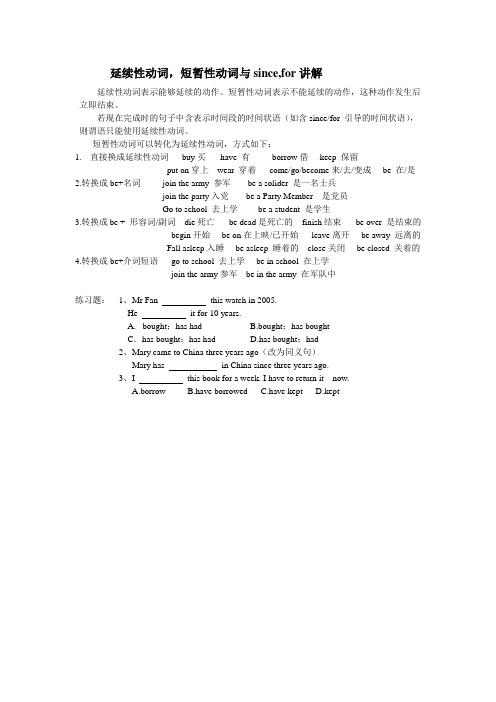
延续性动词,短暂性动词与since,for讲解延续性动词表示能够延续的动作。
短暂性动词表示不能延续的动作,这种动作发生后立即结束。
若现在完成时的句子中含表示时间段的时间状语(如含since/for 引导的时间状语),则谓语只能使用延续性动词。
短暂性动词可以转化为延续性动词,方式如下:1.直接换成延续性动词buy买-----have 有borrow借----keep 保留put on穿上---wear 穿着come/go/become来/去/变成----be 在/是2.转换成be+名词join the army 参军----- be a solider 是一名士兵join the party入党------be a Party Member 是党员Go to school 去上学-------be a student 是学生3.转换成be + 形容词/副词die死亡-----be dead是死亡的finish结束-----be over 是结束的begin开始----be on在上映/已开始leave离开----be away 远离的Fall asleep入睡----be asleep 睡着的close关闭----be closed 关着的4.转换成be+介词短语go to school 去上学----be in school 在上学join the army参军---be in the army 在军队中练习题:1、Mr Fan this watch in 2005.He it for 10 years.A.bought;has hadB.bought;has boughtC.has bought;has had D.has bought;had2、Mary came to China three years ago(改为同义句)Mary has in China since three years ago.3、I this book for a week. I have to return it now.A.borrowB.have borrowedC.have keptD.kept。
过去进行时之常见短暂性动词和延续性动词汇总

过去进行时之常见短暂性动词和延续性动词汇总一、短暂性动词:短暂性动词表示动作(事情)较短时间结束的动词,不能和进行时态连用。
常见的短暂性动词主要有:arrive in(at)\get to\reach到达;come back\return 归来、回来;land 着陆;leave 离开;go 去;come来;see 看见;hear 听到;borrow 借入;lend借出;close 关闭;o pen打开; begin\start开始; finish 结束、完成;become (get)变成、成为;lose 丢失;find 找到、发现;fall跌倒、降落;join 参加、加入;die 去世、死亡;get up起床;go to bed 去睡觉;wake up 苏醒、醒来;buy买;sell卖;turn on打开(电源);turn off关闭(电源)…二、延续性动词:表示动作(事情)延续一段时间完成的动词,可以和进行时态连用。
常见的延续性动词主要有:Do做、干; walk 步行;look at 看;look for 寻找;watch观看; listen to 听;wai t for 等候;wear 穿(戴)着;talk交谈; play 玩耍;study 学习;work 工作;read 阅读;write 书写;eat 吃饭;sleep 睡觉;keep 保存;clean打扫; cook 做饭;have 有……三、when“当……的时候”后面的动词一般采用短暂性动词的一般时态;While“当……的时候”后面的动词一般采用延续性动词的进行时态。
(在处用when或while填空;在处用括号内所给的动词的正确形式填空)、Just now I (come) in, he (r ead) a book.刚才当我进来的时候,他正在看一本书2、The boy (walk) on the street UFO (land) yesterday evening.(昨晚那个男孩正在街上行走当飞碟着陆的时候)3、 we (swim) in the river, we(see) a fish jump out of the water this morning.(当我们正在河里游泳的时候,我们看见一条鱼跳出了水面)4、he (read) , I (write) atthis time of yesterday.(昨天这个时候当他看书时,我在写字)5、Yesterday afternoon I (get) home, my wife (cook) dinner.6、An hour ago you (leave) the bedroom, they (argue) with Mr Luo.7、I (watch) the basketball game, suddenly the(fly) over and (hit) me.8、yesterday evening my parents (wash) clothes, my sister and I (clean).9、What your mother (do) the telephone (ring) My Mother (sleep) , soshe didn*t hear.四、综合练习:1、What you (do) at 9:00 last night I (watch)TV.2、Look! They (play) computers again, an hour ago they(play) computers3、While Jenny (listen) to music, the telephone(ring).4、When we (get) home, it (rain) yesterdaymorning.5、We (buy) a basketball last week, but it is lost( ), so we (buy) another one tomorrow.6、They (do) their homework at 7:. last night,.7、We (play) computers last night.8、They were watching TV when I came in.(变成否定句)9、The polite were looking for that thief.(一般疑问句)。
短暂动词与延续性动词

短暂(duǎnzàn)动词与延续性动词短暂(duǎnzàn)动词与延续性动词1.现在(xiànzài)完成时的构成:have / has + 动词(dòngcí)的过去分词2.现在(xiànzài)完成时的用法:(1)表示某一动作或状态开始(kāishǐ)于过去并持续到现在现在。
(此种用法适用于延续性动词)I have been in Nanyang for around 5 years.我在南阳(nán yánɡ)大约有五年了。
(2)表示过去发生或已经完成的某一动作对现在造成的影响或结果(此种用法适用非延续性动词)。
I can’t go to see the movie now, because I have lost the ticket.现在我看不成电影了,因为我把票弄丢了。
3.现在完成时的标志:just, already, yet, ever, never,recently 近来 = in recent weeks (months, years)在最近的几周(月,年)里,nowadays, for + 一段时间,before (用于句子末尾); so far = up to now = till now; since + 过去某一具体时间点,since + 过去的一段时间 + ago, since + 一般过去时从句,ever since then = ever since = since then = since (自从那时起);in / over /during + the + past(last) + 一段时间。
Eg.On January 11,1998, Dr. Kataria organized the first “World Laughter Day” celebration in Mumbai, India. It was a huge success.The date was later changed to the first Sunday in May and it has been celebrated every year since.4.现在完成时中的特殊用法:短暂动词(dòngcí)的各种时态(包括现在完成时在内)不能和时间段连用(liányòng),当它需要与时间段连用时需转换为延续性动词。
延续性动词和短暂性动词的区别
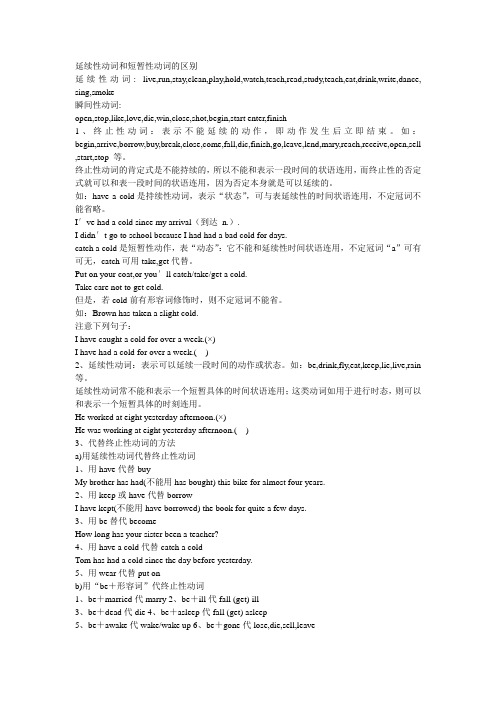
延续性动词和短暂性动词的区别延续性动词: live,run,stay,clean,play,hold,watch,teach,read,study,teach,eat,drink,write,dance, sing,smoke瞬间性动词:open,stop,like,love,die,win,close,shot,begin,start enter,finish1、终止性动词:表示不能延续的动作,即动作发生后立即结束。
如:begin,arrive,borrow,buy,break,close,come,fall,dic,finish,go,leave,lend,mary,reach,receive,open,sell ,start,stop 等。
终止性动词的肯定式是不能持续的,所以不能和表示一段时间的状语连用,而终止性的否定式就可以和表一段时间的状语连用,因为否定本身就是可以延续的。
如:have a cold是持续性动词,表示“状态”,可与表延续性的时间状语连用,不定冠词不能省略。
I′ve had a cold since my arrival(到达n.).I didn′t go to school because I had had a bad cold for days.catch a cold是短暂性动作,表“动态”:它不能和延续性时间状语连用,不定冠词“a”可有可无,catch可用take,get代替。
Put on your coat,or you′ll catch/take/get a cold.Take care not to get cold.但是,若cold前有形容词修饰时,则不定冠词不能省。
如:Brown has taken a slight cold.注意下列句子:I have caught a cold for over a week.(×)I have had a cold for over a week.()2、延续性动词:表示可以延续一段时间的动作或状态。
延续性动词和短暂性动词

例子
学习
需要一段时间来掌握知识和技能 。
工作
通常指一段时间内从事某种职业或 任务。
等待
表示在一段时间内保持某种状态或 期望某事发生。
与短暂性动词的区别
短暂性动词表示的动作或状态持续时 间较短,如“看”、“听”、“摸” 等。
例如,“看”是一个短暂性动词,表 示瞬间完成的动作,而“学习”是一 个延续性动词,表示需要一段时间来 完成的动作。
延续性动词和短暂 性动词
contents
目录
• 延续性动词 • 短暂性动词 • 延续性动词和短暂性动词的使用场景 • 延续性动词和短暂性动词的转换 • 练习与巩固
01
CATALOGUE
延续性动词
定义
01
延续性动词表示的动作或状态持 续时间较长,如“学习”、“工 作”、“等待”等。
02
延续性动词强调动作或状态在一 段时间内的持续性,而不是瞬间 的完成。
延续性动词转换为短暂性动词
睡觉:醒来
抽烟:抽一口 写作:写完
学习:学会 游泳:游过
延续性动词转换为短暂性动词
开车:开一下
唱歌:唱一段
01
02
03
看书:看一眼
喝咖啡:喝一口
04
05
穿衣服:穿一下
短暂性动词转换为延续性动词
离开:逗留 来/去:停留在
结婚:与某人相处
短暂性动词转换为延续性动词
死亡:生活过 到达:在某地待一段时间
示例
我喜欢(看/看过)电影。在这个句子 中,正确的动词形式是“看”,因为 它是一个表示动作的延续性动词。
造句练习
造句练习
根据给定的主题或提示,使用正确的动词形式造句。
示例
短暂性动词和延续性动词
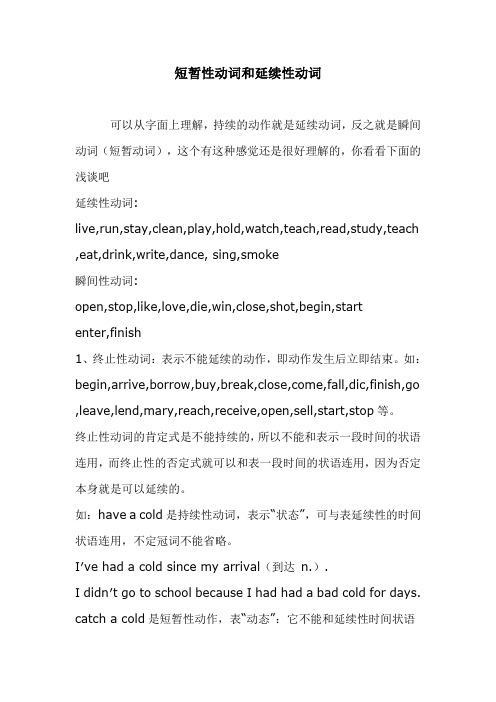
短暂性动词和延续性动词可以从字面上理解,持续的动作就是延续动词,反之就是瞬间动词(短暂动词),这个有这种感觉还是很好理解的,你看看下面的浅谈吧延续性动词:live,run,stay,clean,play,hold,watch,teach,read,study,teach ,eat,drink,write,dance, sing,smoke瞬间性动词:open,stop,like,love,die,win,close,shot,begin,startenter,finish1、终止性动词:表示不能延续的动作,即动作发生后立即结束。
如:begin,arrive,borrow,buy,break,close,come,fall,dic,finish,go ,leave,lend,mary,reach,receive,open,sell,start,stop等。
终止性动词的肯定式是不能持续的,所以不能和表示一段时间的状语连用,而终止性的否定式就可以和表一段时间的状语连用,因为否定本身就是可以延续的。
如:have a cold是持续性动词,表示“状态”,可与表延续性的时间状语连用,不定冠词不能省略。
I′ve had a cold since my arrival(到达n.).I didn′t go to school because I had had a bad cold for days. catch a cold是短暂性动作,表“动态”:它不能和延续性时间状语连用,不定冠词“a”可有可无,catch可用take,get代替。
Put on your coat,or you′ll catch/take/get a cold.Take care not to get cold.但是,若cold前有形容词修饰时,则不定冠词不能省。
如:Brown has taken a slight cold.注意下列句子:I have caught a cold for over a week.(×)I have had a cold for over a week.( )2、延续性动词:表示可以延续一段时间的动作或状态。
短暂性动词与延续性动词语法讲解
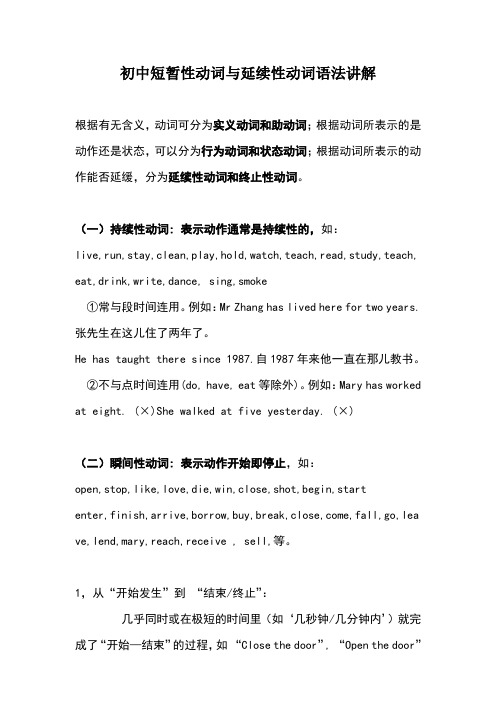
初中短暂性动词与延续性动词语法讲解根据有无含义,动词可分为实义动词和助动词;根据动词所表示的是动作还是状态,可以分为行为动词和状态动词;根据动词所表示的动作能否延缓,分为延续性动词和终止性动词。
(一)持续性动词: 表示动作通常是持续性的,如:live,run,stay,clean,play,hold,watch,teach,read,study,teach, eat,drink,write,dance, sing,smoke①常与段时间连用。
例如:Mr Zhang has lived here for two years.张先生在这儿住了两年了。
He has taught there since 1987.自1987年来他一直在那儿教书。
②不与点时间连用(do, have, eat等除外)。
例如:Mary has worked at eight. (×)She walked at five yesterday. (×)(二)瞬间性动词: 表示动作开始即停止,如:open,stop,like,love,die,win,close,shot,begin,startenter,finish,arrive,borrow,buy,break,close,come,fall,go,lea ve,lend,mary,reach,receive , sell,等。
1,从“开始发生”到“结束/终止”:几乎同时或在极短的时间里(如‘几秒钟/几分钟内’)就完成了“开始—结束”的过程,如“Close the door”, “Open the door”2,有些瞬间动词的“开始—结束的过程”可能稍微长一些,但也不会很长的,如,“buy sth(买下)”:付了款、拿了发票即完成了。
所以,“我买了这块手表5年了”,在汉语中说的通,但英语的表达就不能说:I have bought the watch for five years.buy sth ---- have sth (拥有)---have/has + had sth for…A: I have had the watch for 5 years.B: It is (has been) five years since I bought the watch. C: I bought it 5 years ago.同理,“borrow sth”“借书”在办理了相关的‘登记’手续后就结束了,不可能“借”几个星期或好几年的!汉语“这本书我已经借用了2星期了。
短暂性动词与延续性动词

• 4. Tom and Mary have just come in. They ______ to a party.
• 5. Tom and Mary aren’t here. They ______ to a Party.
整理课件
7
• 6. My father ______ to New York. He left this morning.
• 7. The film began ten minutes ago. (同义句)
• The film _____ _____ _____ for ten minutes. • 8. I borrowed this book two weeks ago. (同义句)
• I _____ _____ this book for two weeks.
• 7. My mother ______ to the supermarket and she has taken my bag with her.
• 8. None of us ______ to England. • 9. “I’ve come to see Tom.” • “But he is not here. He ______ to your
My father ______ ______ the car ____ half
a year.
整理课件
5
• 6. We got to know each other for about 15 years. (同义句)
• We _____ _____ each other _____ about 15 years.
• The factory _______ _____ ______ for ten years.
短暂性动词与延续性动词语法讲解
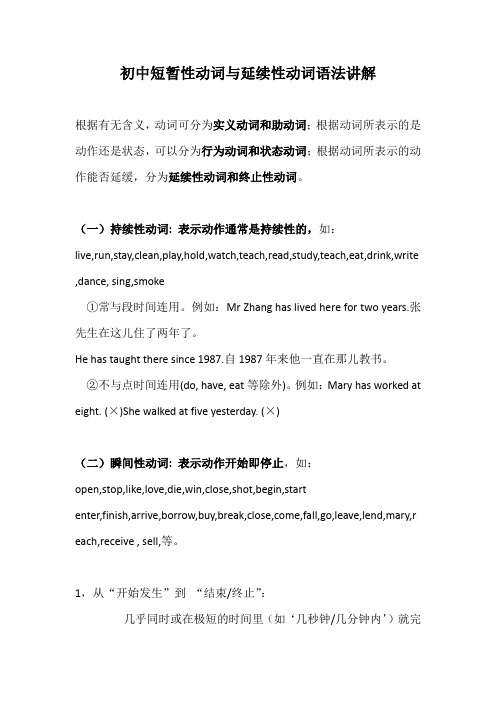
初中短暂性动词与延续性动词语法讲解根据有无含义,动词可分为实义动词和助动词;根据动词所表示的是动作还是状态,可以分为行为动词和状态动词;根据动词所表示的动作能否延缓,分为延续性动词和终止性动词。
(一)持续性动词: 表示动作通常是持续性的,如:live,run,stay,clean,play,hold,watch,teach,read,study,teach,eat,drink,write ,dance, sing,smoke①常与段时间连用。
例如:Mr Zhang has lived here for two years.张先生在这儿住了两年了。
He has taught there since 1987.自1987年来他一直在那儿教书。
②不与点时间连用(do, have, eat等除外)。
例如:Mary has worked at eight. (×)She walked at five yesterday. (×)(二)瞬间性动词: 表示动作开始即停止,如:open,stop,like,love,die,win,close,shot,begin,startenter,finish,arrive,borrow,buy,break,close,come,fall,go,leave,lend,mary,r each,receive , sell,等。
1,从“开始发生”到“结束/终止”:几乎同时或在极短的时间里(如‘几秒钟/几分钟内’)就完成了“开始—结束”的过程,如“Close the door”, “Open the door”2,有些瞬间动词的“开始—结束的过程”可能稍微长一些,但也不会很长的,如,“buy sth(买下)”:付了款、拿了发票即完成了。
所以,“我买了这块手表5年了”,在汉语中说的通,但英语的表达就不能说:I have bought the watch for five years.buy sth ---- have sth (拥有)---have/has + had sth for…A: I have had the watch for 5 years.B: It is (has been) five years since I bought the watch.C: I bought it 5 years ago.同理,“borrow sth”“借书”在办理了相关的‘登记’手续后就结束了,不可能“借”几个星期或好几年的!汉语“这本书我已经借用了2星期了。
短暂性动词与延续性动词
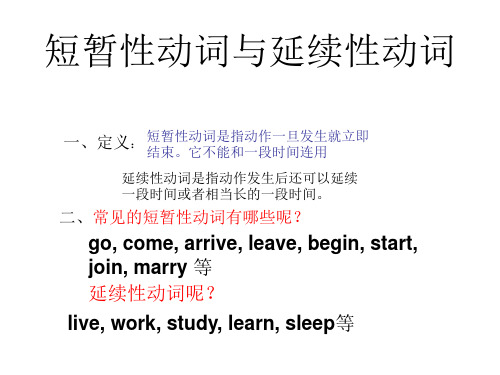
• 11. The young man ______ to Beijing. He is working there now. • 12. The students ______ to the cinema to see a film today. Now they are back. • 13. Tom isn’t at home. He ______ to school. • 14. Mr. and Mrs. Smith ______ to London now. • They ______ there twice already. • 15. Mr. Smith ______ to Britain and France this year. Now he is telling his students about his trip.
of…
borrow →keep come → be in
buy/get →have
marry → be married
习题
• 1. Mr. Li began to teach English in this school in 1999.(同义句) • Mr. Li ______ _______ English in this school since 1999. • 2. The factory opened ten years ago.(同 义句 • The factory _______ _____ ______ for ten years.
• 16. All the students ______ to the meeting to listen to a lecture. • 17. Where is Jerry? • He isn’t here now. He ______ to the library to borrow books. • 18. Miss Li ______ never ______ to China before. • 19. Where ______ you ______? The meeting has already begun. • 20. Where ______ he ______? I can’t find him anywhere.
(完整版)现在完成时之短暂性动词与延续性动词用法
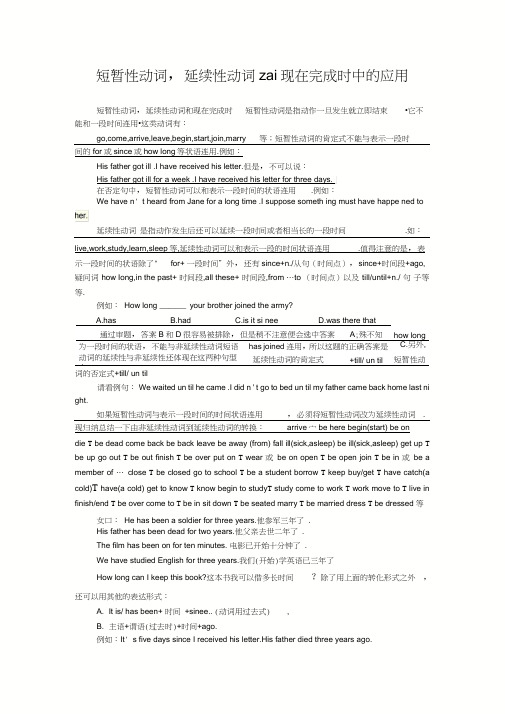
A.hasB.hadC.is it si neeD.was there that
通过审题,答案B和D很容易被排除,但是稍不注意便会选中答案
A;殊不知
how long
为一段时间的状语,不能与非延续性动ห้องสมุดไป่ตู้短语
has joined连用,所以这题的正确答案是
How long can I keep this book?这本书我可以借多长时间?除了用上面的转化形式之外,
还可以用其他的表达形式:
A.It is/ has been+时间+sinee(动词用过去式),
B.主语+谓语(过去时)+时间+ago.
例如:It's five days since I received his letter.His father died three years ago.
延续性动词 是指动作发生后还可以延续一段时间或者相当长的一段时间.如:
live,work,study,learn,sleep等,延续性动词可以和表示一段的时间状语连用.值得注意的是,表
示一段时间的状语除了"for+一段时间”外,还有since+n./从句(时间点),since+时间段+ago,
疑问词how Iong,in the past+时间段,all these+时间段,from…to(时间点)以及till/until+n./句子等等.
It is/ has bee n three days since he left Shan ghai.
Three days has passed since he left Shan ghai.
英语短暂性动词和延续性动词
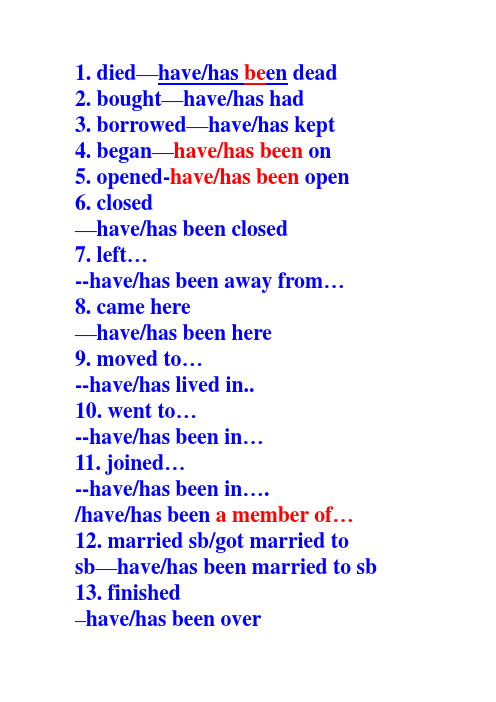
1. died—have/has be en dead2. bought—have/has had3. borrowed—have/has kept4. began—have/has been on5. opened-have/has been open6. closed—have/has been closed7. left…--have/has been away from…8. came here—have/has been here9. moved to…--have/has lived in..10. went to…--have/has been in…11. joined…--have/has been in…./have/has been a member of…12. married sb/got married to sb—have/has been married to sb 13. finished–have/has been over14. made/became friends—have/has been friends15. began to teach—have/has taught16. lose (lost)—haven’t/hasn’t had17.become (became)—have/has been ******************************* * He went to London in 1990. He is still in London now.→He has been in London since 1990. * I borrowed the book two weeks ago. →I have kept the book for two weeks/since two weeks ago.It is two weeks since I borrowed the book.●He joined the League two yearsago. = It is two years since hejoined the League.= He has been in the League for two years/ since two years ago.同义句(用两种方法变):1.The film began ten minutes ago. It is …since….It is ten minutes since the film began. The film has been on for ten minutes/since ten minutes ago.2.It is three days since he left.He left three days ago.He has been away from here for three days/since three days ago.3.He came here half an hour ago,and he is still here now.It is half an hour since he came here. He has been here for half an hour./since half an hour ago.4.Mary married Tom ten years ago. It is ten years since Mary married Tom.Mary has been married to Tom for ten years/since ten years ago.5.I began to teach English fourteenyears ago.It is fourteen years since I began to teach English.I have taught English for fourteen years/since fourteen years ago.I have been an English teacher for 14 years.Test in class1.He moved to Shenzhen two yearsago.It is two years since he moved to Shenzhen.He has lived in Shenzhen for two years/since two years ago.2.My father went to Shanghai lastweek.It is a week since my father went to Shanghai.My father has been in Shanghai since last week.3.Mike joined the army three yearsago.It is three years since Mike joined the army.Mike has been in the army for three years/since three years ago.4.It is ten minutes since the filmbegan.The film began ten minutes ago.The film has been on for ten minutes/since ten minutes ago.5.He bought the computer fourweeks ago.It is four weeks since he bought the computer.He has had the computer for four weeks/since four weeks ago.。
短暂性动词与延续性动词的用法

短暂性动词与延续性动词在现在完成时中的用法英语中的动词有多种分类法。
根据其有无含义,动词可分为实义动词和助动词;根据动词所表示的是动作还是状态,可以分为行为动词和状态动词;根据动词所表示的动作能否延缓,分为延续性动词和终止性动词。
英语中,按动词延续的时间长短,可将动词分为延续性动词和短暂性动词。
延续性动词如learn, study, work, play, wait,have,,live,teach,keep,like 等。
短暂性动词是非延续性动词,即动作一开始便结束的动词,又可称结束性动词,瞬间动词,如leave, begin, start, return, arrive, reach, die, marry, bear, see, hear, receive, buy, get, enter, take off, start off, come in, come back, take place, break out, put on, put down, go in 等。
终止性动词构成的现在完成时,不可以用表示一段时间的状语(如:since 和for引导的短语)来修饰,终止性动词构成的现在完成时,只表示动作发生的因果关系,不能表示动作的延续,因此不能用表示一段时间的状语来修饰。
如可以说:The Red Cross has already started for the earthquake-stricken area.但不可说:The Red Cross has already started for the earthquake-stricken area for three days.因为start是终止性动词, 它所表示的动作短促, 当红十字会出发时,start这个动作便结束了, 不可能延续两天。
1. 用ago时间状语短语来代替since或for引导的时间状语:eg. Mr. Richard has returned from America for two years. (wrong) Mr. Richard has returned from America since two years ago. (wrong) 应改为: He returned from America two years ago.2.用It is… since…复合句代替简单句eg. It has been/is two years since Mr. Richard returned from America.注意:以上两种办法适用于所有终止性动词。
短暂性动词,延续性动词和现在时

短暂性动词,延续性动词和现在完成时延续性动词是指动作发生后还可以延续一段时间或者相当长的一段时间。
如:live,work, study, learn, sleep等,延续性动词可以和表示一段的时间状语连用。
短暂性动词是指动作一旦发生就立即结束。
它不能和一段时间连用。
这类动词有:go,e, arrive, leave, begin, start, join, marry等;★在否定句中,短暂性动词可以和表示一段时间的状语连用。
We haven’t heard from Jane for a long time.★短暂性动词的肯定式不能与表示一段时间的for或since或howlong等状语连用。
★值得注意的是,表示一段时间的状语除了“for+一段时间”外,还有since+n./从句(时间点),since+时间段+ago,疑问词how long,in the past+时间段,all these+时间段,from…to(时间点)以及till/until+n./句子等等。
例如:.I have received his letter for three days(×)I have received his letter.(√)How long did she leave .(×)How long has she been away? (√)★★★如果短暂性动词与表示一段时间的时间状语连用,必须将短暂性动词改为延续性动词。
现归纳总结一下由非延续性动词到延续性动词的转换:arrive→be herebegin(start)→be ondie →be deade back→be backleave →be away (from)fall ill(asleep)→be ill( asleep) get up→be up finish →be overput on →wear 或be onopen →be openclose →be closedjoin →be in/ be a member ofgo to school→be a studentborrow→keepcatch(a cold)→ have(a cold)get to know →knowbegin to study→studye to work→workmove to → live infinish/end → be overe to → be inarrive→be here★除了用上面的转化形式之外,还可以用其他的表达形式:A.It is 或者It has been+时间+since……(动词用过去式),B.主语+谓语(过去时)+时间+ago。
- 1、下载文档前请自行甄别文档内容的完整性,平台不提供额外的编辑、内容补充、找答案等附加服务。
- 2、"仅部分预览"的文档,不可在线预览部分如存在完整性等问题,可反馈申请退款(可完整预览的文档不适用该条件!)。
- 3、如文档侵犯您的权益,请联系客服反馈,我们会尽快为您处理(人工客服工作时间:9:00-18:30)。
1.现在完成时的构成:have / has + 动词的过去分词2.现在完成时的用法:(1)表示某一动作或状态开始于过去并持续到现在现在。
(此种用法适用于延续性动词)I have been in Nanyang for around 5 years.我在南阳大约有五年了。
(2)表示过去发生或已经完成的某一动作对现在造成的影响或结果(此种用法适用非延续性动词)。
I can’t go to see the movie now, because I have lost the ticket.现在我看不成电影了,因为我把票弄丢了。
3.现在完成时的标志:just, already, yet, ever, never, recently 近来 = in recent weeks (months, years)在最近的几周(月,年)里,nowadays, for + 一段时间,before (用于句子末尾); so far = up to now = till now; since + 过去某一具体时间点,since + 过去的一段时间 + ago, since + 一般过去时从句,ever since then = ever since = since then = since (自从那时起);in / over /during + the + past(last) + 一段时间。
Eg.On January 11,1998, Dr. Kataria organized the first “World Laughter Day” celebration in Mumbai, India. It was a huge success. The date was later changed to the first Sunday in May and it has been celebrated every year since.4.现在完成时中的特殊用法:短暂动词的各种时态(包括现在完成时在内)不能和时间段连用,当它需要与时间段连用时需转换为延续性动词。
注意:短暂动词若用于否定句则可与一段时间相连用。
I haven’t seen him for a long time. 我好久不见他了。
5.常见短暂动词转换成延续性动词的形式如下:get lost --- be lost get / fall ill --- be ill get in touch with --- be/keep in touch with get to --- be in / at get into --- be in get into trouble --- be in trouble get out of --- be out of reach --- be in / at arrive at / in --- be at / in get up --- be upget married to sb.---be married to sb.marry sb. --- be married to sb.fall in love with sb. --- be in love with sb.fall asleep ---be asleep make friends --- be friendsbuy/get/receive --- have go / come to --- be in / atgo out --- be out go there --- be therego abroad --- be abroad go to sleep --- sleepgo to bed --- be in bed finish --- be overgo to school --- be a student, be at schoolmeet --- be together wake up --- be awakeget to know --- know begin --- be oncatch a cold --- have a cold borrow --- keepdie ---be dead leave --- be away (from)close --- be closed open --- be openjoin --- be a member of / be injoin the Party --- be a Party member, be a member of the Party, be in the Partyjoin the army --- be a soldier, be in the armybecome / get / fall + adj. or n. --- be + adj. or n.become a teacher --- be a teachercome back / get back / return --- be backput on --- wear / be dressed in stand up --- standsit down --- sit lie down --- liegraduate = leave school --- be away from schoolNotice: 凡是含有become , fall, go, get, join 等的短语及其本身大都是短暂动词,它们的各种时态通常都不与一段时间相连用,把它们转化成延续性动词的方法一般是把含有这些词的短语变成含有连系动词动词be有关的短语。
6.三个特殊现在完成时短语的用法区别have / has been to 表示曾经去过某地但现在已经回来,可以和次数相连用但不能和一段时间相连用。
She has been to Cuba many times. 他去过古巴好多次了。
have / has gone to 表示已经到某地去了,到现在还没有回来,它既不能和次数相连用也不能和一段时间相连用。
I haven’t seen him for a long time. Where has he gone?我好久不见他了。
他到哪去了?have / has been in 表示在某地,它不能和次数相连用但可以和一段时间相连用。
She has been in Cuba for a long time. 她在古巴有好长一段时间了。
一、用since 或for 填空。
(共15 分,每小题1.5分)1.His father has been dead ______ he was ten years old.2.He has been away from the army ______ six years.3.He has been in Beijing ______ 2003.4.He has had a car ______ two months.5.He has kept the book ______ the day before yesterday.6.(1)Kate has had a new bike ______ two days.(2)Kate has had a new bike ______ two days ago.7.(1)Ann has kept in touch with Jane ______ seven years ago.(2)Ann has kept in touch with Jane ______ seven years.8.My uncle has been in the party ______ last year.9.My uncle has been a member of the Party ______ one year.10.It has been ten years ______ we met last time.二、单项选择。
(共60 分,每小题2 分)1.Lucy and Lily ______ China for 5 years.A.has been inB.have been inC.have been toD.have gone to2.---Oh, you’re late again. The film ______ for twenty minutes.---What a pity!A.has begunB.beganC.has been onD.have been on3.I must go home now. I have been away from home ______.A.since 9 o’clockB.for two hours agoC.for 9 o’clockD.at 9 o’clock4.---My grandpa ______ for seven years.---I’m sorry to hear that.A.diedB.deadC.has been deadD.has died5.---Mrs. Green, your hat looks nice. Is it new?---No, I ______ it for two months.A.have hadB.have boughtC.boughtD.had6.Mrs. King has ______ for over 3 years.A.gone go to abroadB.been to abroadC.gone abroadD.been abroad7.You ______ my bike for two days. Could you please return it to me soon?A.have borrowedB.have lentC.have keptD.borrowed8.---Do you know her well?---Sure, we ______ friends since ten years ago.A.wereB.have madeC.have beenD.have become9.Maria ______ this pair of shoes for about six years. It’s too old to wear.A.has boughtB.has hadC.boughtD.had10.Uncle Chen ______ Shanghai for five years.A.has gone toB.has gone toC.wentD.has been in11.I have a nice watch. I have had it ______ 2 months.A.sinceB.inC.forD.after12.The fisherman ______ at the bank of the river ______ 8 o’clock.A.has been; forB.has come; atC.has been; sinceD.came; since13.Mr. Li _______ England. He ______ London for two weeks.A.has been to; has been toB.has gone to; has been inC.has been to; has been inD.has gone to; has been to14.---How long have you _______ watch? It looks new.---Only about three weeks.A.hadB.boughtC.receivedD.borrowed15.---The missing boy hasn’t been found yet?---Yeah, he ______ since three months ago.A.lostB.has been lostC.lost himselfD.has lost himself16.Mr. Li has ______ for a whole week.A.got illB.been illC.gotten illD.fallen ill17.I have ______ in touch with my old friend, Li Ming for a number of years.A.beenB.keptC.A and BD.gotten18.---Mr. Wilson ______ Wuhan International Airport for half anhour.---Hasn’t he? I must pick him up right now.A.has gotten toB.has got toC.has been atD.has been in19.---I have ______ the train station for two hours and a half.---I’m so sorry for having you wait for so long.A.reachedB.arrived atC.been inD.been at20.Have you ______ since the big fire happened?A.gotten upB.been upC.got upD.get up21.Ann has ______ married ______ Kris for over nine years.A.gotten, toB.gotten, withC.been, toD.been, with22.Ann has ______ in love ______ Kris for almost ten years.A.been, withB.been, toC.fallen, toD.fallen, with23.---Is your father still in Italy?---No, he has ______ for about half a month.e backB.got backC.returnedD.been back24.---How long have you ______ this new coat?---For about three days.A.put onB.been onC.putted onD.worn25.I’m sorry for having you ______ here for so long.A.stand upB.to stand upC.standD.to stand26.Sheila has ______ on the sofa watching TV for four hours.A.sittedB.sitedC.sat downD.sat27.Elliont has ______ on the bed for the whole morning.inB.liedy downD.lied down28.---I telephoned you last night. But no one answered.---Oh, I ______ for the whole night.A.were outB.went outC.have been outD.have gone out29.---Have you met your uncle? I hear he is also in Nanjing.---Yes. We ______ for nearly a week.A.have metB.have togetherC.have been togetherD.met30.---Where is Mr. Smith?---He has ______ for half an hour.A.gone to sleepB.been sleepC.gone sleepingD.slept三、句型转换。
